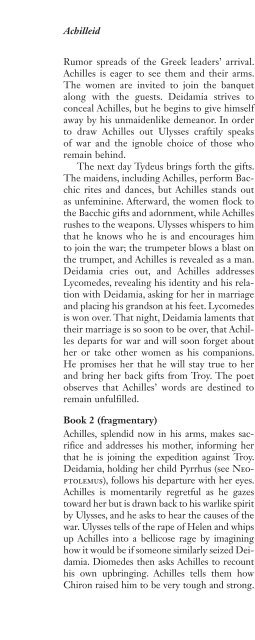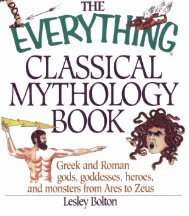Encyclopedia of Greek and Roman Mythology (Facts on File Library ...
Encyclopedia of Greek and Roman Mythology (Facts on File Library ...
Encyclopedia of Greek and Roman Mythology (Facts on File Library ...
You also want an ePaper? Increase the reach of your titles
YUMPU automatically turns print PDFs into web optimized ePapers that Google loves.
Achilleid<br />
Rumor spreads <str<strong>on</strong>g>of</str<strong>on</strong>g> the <str<strong>on</strong>g>Greek</str<strong>on</strong>g> leaders’ arrival.<br />
Achilles is eager to see them <str<strong>on</strong>g>and</str<strong>on</strong>g> their arms.<br />
The women are invited to join the banquet<br />
al<strong>on</strong>g with the guests. Deidamia strives to<br />
c<strong>on</strong>ceal Achilles, but he begins to give himself<br />
away by his unmaidenlike demeanor. In order<br />
to draw Achilles out Ulysses craftily speaks<br />
<str<strong>on</strong>g>of</str<strong>on</strong>g> war <str<strong>on</strong>g>and</str<strong>on</strong>g> the ignoble choice <str<strong>on</strong>g>of</str<strong>on</strong>g> those who<br />
remain behind.<br />
The next day Tydeus brings forth the gifts.<br />
The maidens, including Achilles, perform Bacchic<br />
rites <str<strong>on</strong>g>and</str<strong>on</strong>g> dances, but Achilles st<str<strong>on</strong>g>and</str<strong>on</strong>g>s out<br />
as unfeminine. Afterward, the women flock to<br />
the Bacchic gifts <str<strong>on</strong>g>and</str<strong>on</strong>g> adornment, while Achilles<br />
rushes to the weap<strong>on</strong>s. Ulysses whispers to him<br />
that he knows who he is <str<strong>on</strong>g>and</str<strong>on</strong>g> encourages him<br />
to join the war; the trumpeter blows a blast <strong>on</strong><br />
the trumpet, <str<strong>on</strong>g>and</str<strong>on</strong>g> Achilles is revealed as a man.<br />
Deidamia cries out, <str<strong>on</strong>g>and</str<strong>on</strong>g> Achilles addresses<br />
Lycomedes, revealing his identity <str<strong>on</strong>g>and</str<strong>on</strong>g> his relati<strong>on</strong><br />
with Deidamia, asking for her in marriage<br />
<str<strong>on</strong>g>and</str<strong>on</strong>g> placing his gr<str<strong>on</strong>g>and</str<strong>on</strong>g>s<strong>on</strong> at his feet. Lycomedes<br />
is w<strong>on</strong> over. That night, Deidamia laments that<br />
their marriage is so so<strong>on</strong> to be over, that Achilles<br />
departs for war <str<strong>on</strong>g>and</str<strong>on</strong>g> will so<strong>on</strong> forget about<br />
her or take other women as his compani<strong>on</strong>s.<br />
He promises her that he will stay true to her<br />
<str<strong>on</strong>g>and</str<strong>on</strong>g> bring her back gifts from Troy. The poet<br />
observes that Achilles’ words are destined to<br />
remain unfulfilled.<br />
Book 2 (fragmentary)<br />
Achilles, splendid now in his arms, makes sacrifice<br />
<str<strong>on</strong>g>and</str<strong>on</strong>g> addresses his mother, informing her<br />
that he is joining the expediti<strong>on</strong> against Troy.<br />
Deidamia, holding her child Pyrrhus (see Neoptolemus),<br />
follows his departure with her eyes.<br />
Achilles is momentarily regretful as he gazes<br />
toward her but is drawn back to his warlike spirit<br />
by Ulysses, <str<strong>on</strong>g>and</str<strong>on</strong>g> he asks to hear the causes <str<strong>on</strong>g>of</str<strong>on</strong>g> the<br />
war. Ulysses tells <str<strong>on</strong>g>of</str<strong>on</strong>g> the rape <str<strong>on</strong>g>of</str<strong>on</strong>g> Helen <str<strong>on</strong>g>and</str<strong>on</strong>g> whips<br />
up Achilles into a bellicose rage by imagining<br />
how it would be if some<strong>on</strong>e similarly seized Deidamia.<br />
Diomedes then asks Achilles to recount<br />
his own upbringing. Achilles tells them how<br />
Chir<strong>on</strong> raised him to be very tough <str<strong>on</strong>g>and</str<strong>on</strong>g> str<strong>on</strong>g.<br />
He was trained in running, hunting, warfare, <str<strong>on</strong>g>and</str<strong>on</strong>g><br />
other manly pursuits. He recalls all that he can,<br />
then remarks that his mother knows the rest.<br />
CoMMEntARy<br />
With the Achilleid, Statius c<strong>on</strong>tinues his daring<br />
<str<strong>on</strong>g>and</str<strong>on</strong>g> highly original adaptati<strong>on</strong> <str<strong>on</strong>g>of</str<strong>on</strong>g> the epic<br />
traditi<strong>on</strong> to unc<strong>on</strong>venti<strong>on</strong>ally framed mythological<br />
themes. In the Thebaid, Statius took<br />
a mythological sequence—the Seven against<br />
Thebes—with str<strong>on</strong>g tragic associati<strong>on</strong>s <str<strong>on</strong>g>and</str<strong>on</strong>g>,<br />
in adapting them to epic narrative, went out<br />
<str<strong>on</strong>g>of</str<strong>on</strong>g> his way to intensify the presence <str<strong>on</strong>g>of</str<strong>on</strong>g> tragedy<br />
<str<strong>on</strong>g>and</str<strong>on</strong>g> tragic paradigms within the space <str<strong>on</strong>g>of</str<strong>on</strong>g> epic.<br />
Statius is a writer at <strong>on</strong>ce intensely <str<strong>on</strong>g>and</str<strong>on</strong>g> selfc<strong>on</strong>sciously<br />
traditi<strong>on</strong>al, <str<strong>on</strong>g>and</str<strong>on</strong>g> at the same time<br />
audaciously original. In the present instance,<br />
Statius writes the story <str<strong>on</strong>g>of</str<strong>on</strong>g> the hero Achilles—<br />
a figure so famously <str<strong>on</strong>g>and</str<strong>on</strong>g> indelibly represented<br />
by Homer in his Iliad that there would seem<br />
to be no plausible area for improvement or<br />
emulati<strong>on</strong>. Statius points out, however, that<br />
there is more to Achilles’ story than Homer<br />
wrote about, <str<strong>on</strong>g>and</str<strong>on</strong>g> this “more” c<strong>on</strong>stitutes an<br />
important justificati<strong>on</strong> for his epic. Statius<br />
will fill in the interstices with episodes Homer<br />
does not include, yet in such a way as to transform<br />
our percepti<strong>on</strong> <str<strong>on</strong>g>of</str<strong>on</strong>g> the properly heroic<br />
episodes that Homer does include <str<strong>on</strong>g>and</str<strong>on</strong>g> that<br />
Statius now commits to rewriting (although,<br />
in the event, the poem remained incomplete,<br />
<str<strong>on</strong>g>and</str<strong>on</strong>g> Statius did not arrive at the Iliadic porti<strong>on</strong><br />
<str<strong>on</strong>g>of</str<strong>on</strong>g> Achilles’ narrative). Provocatively,<br />
Statius will write “the entire hero,” i.e., the<br />
whole story <str<strong>on</strong>g>of</str<strong>on</strong>g> his life, instead <str<strong>on</strong>g>of</str<strong>on</strong>g> a mere distillati<strong>on</strong><br />
<str<strong>on</strong>g>of</str<strong>on</strong>g> his heroic career. In making this<br />
choice, Statius violates the epic c<strong>on</strong>venti<strong>on</strong>,<br />
spanning the period from Homer’s practice to<br />
Horace’s precepts, <str<strong>on</strong>g>of</str<strong>on</strong>g> commencing epic narrati<strong>on</strong><br />
in medias res, i.e., starting in the midst <str<strong>on</strong>g>of</str<strong>on</strong>g><br />
an <strong>on</strong>going development rather than from the<br />
very beginning.<br />
Statius was excepti<strong>on</strong>ally alert to questi<strong>on</strong>s<br />
<str<strong>on</strong>g>of</str<strong>on</strong>g> beginning <str<strong>on</strong>g>and</str<strong>on</strong>g> ending, as, for example, the<br />
beginning <str<strong>on</strong>g>of</str<strong>on</strong>g> his Thebaid dem<strong>on</strong>strates, <str<strong>on</strong>g>and</str<strong>on</strong>g> he<br />
was thus equally aware <str<strong>on</strong>g>of</str<strong>on</strong>g> the c<strong>on</strong>sequences







